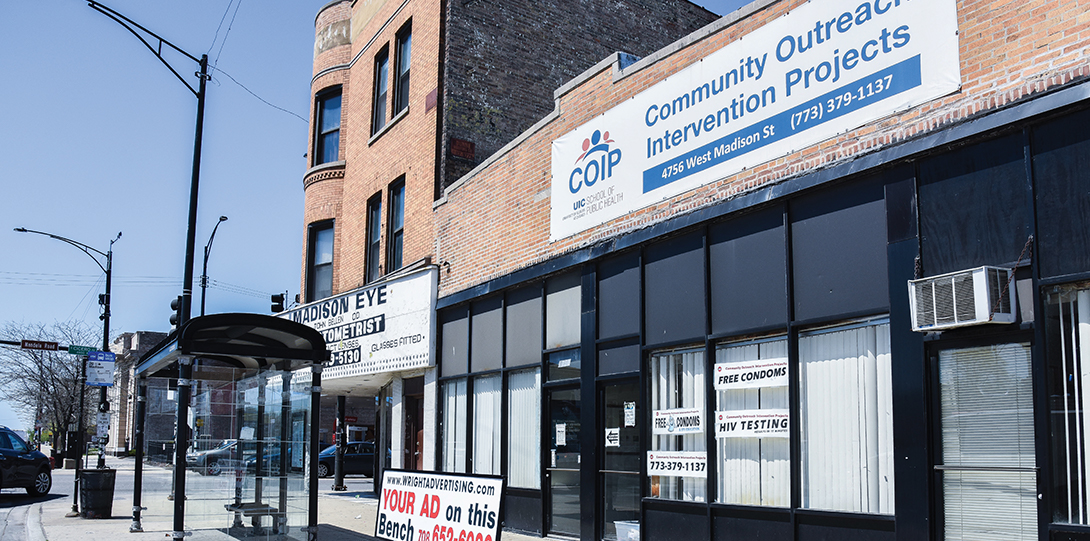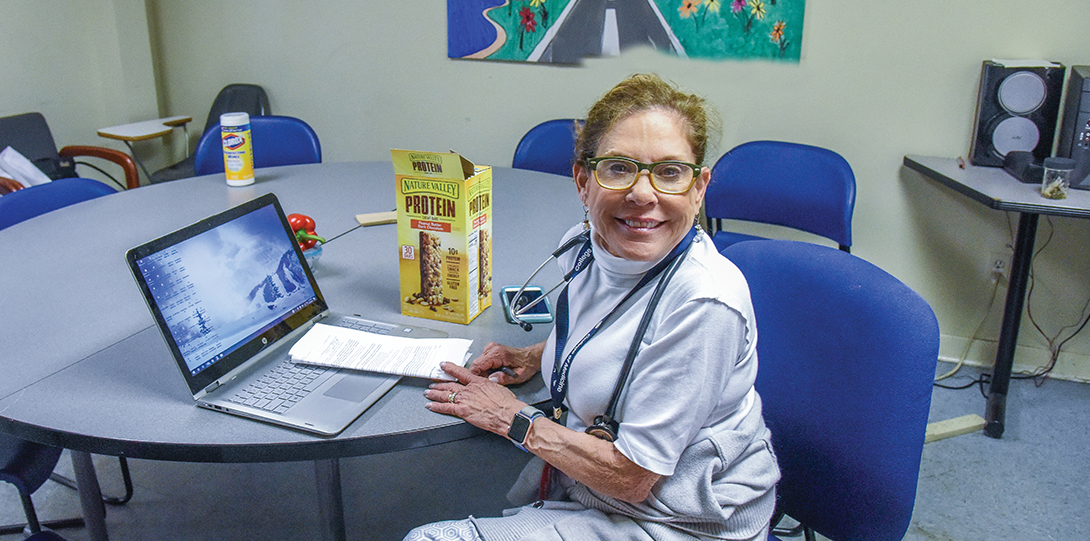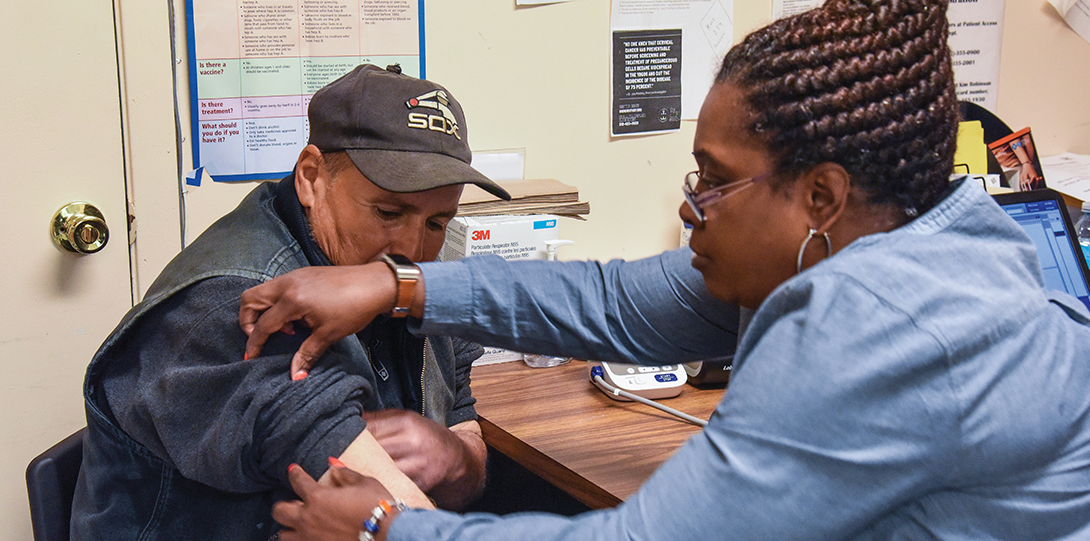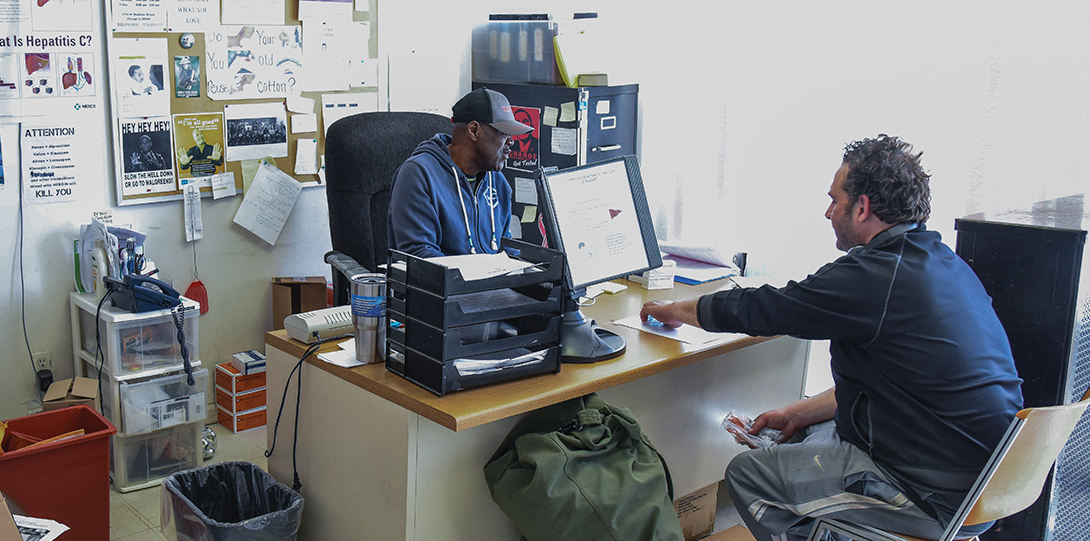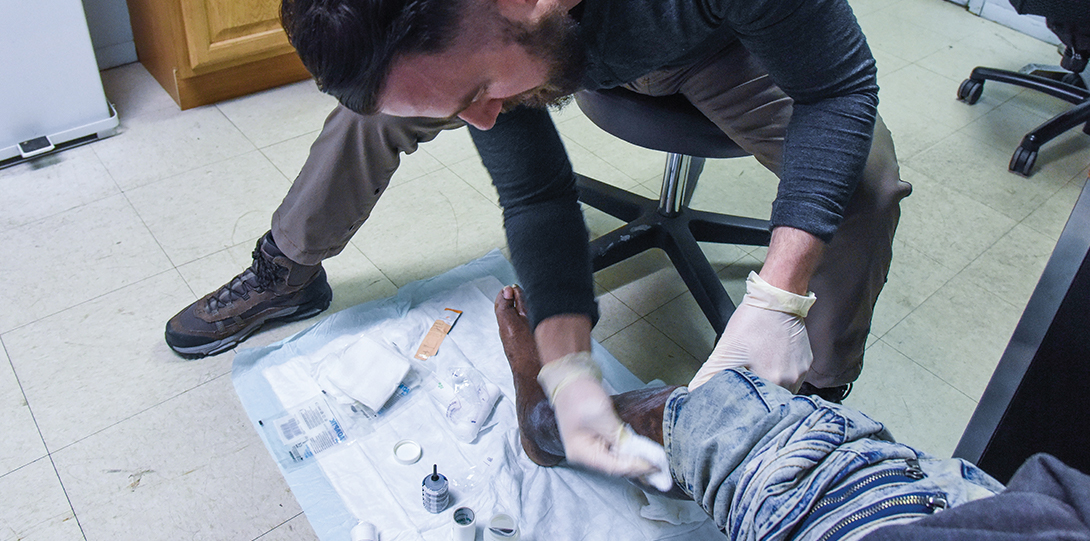UIC Nursing part of innovative clinic at needle-exchange site
Overdose may be the most serious, but it’s not the only health threat facing growing numbers of Americans who inject opioids and other drugs. Hampered by addiction, people who use drugs often avoid seeking any type of healthcare. Now, UIC clinicians are meeting people who use drugs where they are.
It’s a sunny Friday in April, and Karen Cotler knows she doesn’t have much time. Her patient, Marissa, is in a hurry. With her ride waiting outside, Marissa has what she came here for: a bundle of clean needles, water and alcohol pads.
The two women are at the West Side field office of UIC’s Community Outreach Intervention Project (COIP), a busy needle-exchange site located in a strip of aging brick buildings near Madison Street and Cicero Avenue. The windows are plastered with signs that advertise “Free Condoms” and “HIV Testing.”
Cotler, DNP, FNP-BC, FAANP, a family nurse practitioner and clinical assistant professor in the UIC College of Nursing, races to catch Marissa before she leaves. Like most of Cotler’s patients here, Marissa (not her real name) suffers from addiction, but it’s only one of her health concerns. She also has untreated Addison’s disease and skin infections where she injects drugs.
It’s common for people who use drugs to go long periods of time without seeking healthcare. So now, healthcare is seeking them.
Through an innovative collaboration, the UIC College of Nursing is joining UIC’s School of Public Health and College of Medicine to operate a weekly clinic at the needle-exchange site. In years past, COIP clients presenting with illness or injury might get a recommendation from staffers to visit a doctor or an emergency room—advice they might or might not heed. Now they can get primary care, wound care, hepatitis C treatment and treatment for opioid dependence right on site.
Eventually Cotler convinces Marissa to let her look at a wound that was evident during Marissa’s last visit two weeks prior. In a small windowless room, Marissa lowers her track pants to reveal an angry, red circle on her thigh.
Confronting a public health crisis
For more than three decades, the UIC School of Public Health has operated COIP as a way to reduce the spread of HIV and AIDS by providing HIV testing and sterile needles to people who inject drugs.
The services are needed now more than ever as the opioid epidemic remains a growing public health crisis. There are more than 750,000 people in the U.S. who currently inject drugs, according to the journal American Family Physician. Among those individuals, skin and soft tissue infections are the most common medical complication and the top reason for hospitalization.
Care providers and clients at COIP say the expanded clinical services, supported by a $100,000 grant from the Hearst Foundation, are reaching a population that needs primary care in a place that they feel safe and already visit regularly.
“One of the big problems for COIP staff was that they would see clients come in with acute medical problems and they’d refer them to other clinics, but [the clients were] reluctant to go,” says Stockton Mayer, assistant professor at the UIC College of Medicine and director of Urban Global Health. “They didn’t feel those clinics were sympathetic to some of the stuff they dealt with in their addiction, and frankly, sometimes they were just embarrassed to be interacting with other people.”
Instead of seeking timely care, in many cases, clients would let the wounds fester until visiting an emergency room was their last option, he says.
“What we saw was a huge healthcare need,” Mayer says. “Skin and soft tissue infections and wound care were main priorities. Things like hepatitis C and psychiatric care were also on the forefront of clients’ minds. We thought this was a great opportunity to expand services.”
Mayer knew UIC Nursing assistant professor Gabriel Culbert, PhD ’12, BSN ’04, RN, whose research addresses problems of drug dependence in Indonesian prisons. At Mayer’s invitation, Culbert joined the team submitting the grant proposal to Hearst, making the College of Nursing, College of Medicine and School of Public Health equal partners in the project.
“It’s been a great multidisciplinary approach to a really significant problem,” Mayer says. The one-year Hearst grant jump-started the clinic, but the goal is for it to live on—becoming self-sustaining through insurance reimbursements on behalf of the many patients who have Medicaid-managed plans.
Somebody cares
The fact that clients have a trusted relationship with COIP makes them much more likely to feel comfortable receiving medical care there. Many of the staff working there are peers—people who are themselves recovering from drug dependence and who can relate to clients’ experiences.
Ismael, who has been coming to the West Side COIP field office for four or five years, says the clinic is “the greatest thing they’ve done.” He says the clinicians discovered his high blood pressure and put him on a low-dose medication. He says they treat him and other clients “like family.”
“People can come and [get care] and not feel ashamed because everybody here is just like them,” he says. “I think that’s the most beautiful thing.”
He adds: “At least somebody cares, you know?”
A program with a plan
Primary care services through COIP are already growing. Beyond the brick-and-mortar clinic, care is also available on COIP’s mobile van, reaching more people where they are. Also, there’s a plan to offer services at the center more than once a week.
Cotler is especially pleased that, as they deliver primary care, clinicians are confronting two public health crises: opioid addiction and hepatitis C. Through COIP, they can treat patients for both. She and Sarah Messmer, a UIC physician, are now approved to offer Suboxone treatment, oral film that helps drug addicts decrease their craving for opioids.
“If in the time I’m there, I get one person to stay on Suboxone and not go back to IV heroin, that would be worth all the effort,” Cotler says.
“Safe with us”
Back on that sunny April day, the clinic was already buzzing before Marissa arrived. Messmer and Cotler are both seeing patients, but there’s only one exam room. Clients there to get clean needles need to wait their turn for clinical services. That can be a challenge for this population, says Antonio “Dave” Jimenez, COIP director.
“Their lives are structured around needs related to their addiction: Fear of feeling sick, fear of withdrawing, where to get money or go for drugs,” he says. “It affects their motivations and ability to wait.”
The providers recognize that they may need to do things differently than they would in a more conventional clinic. For instance, they prioritize treating someone before getting that patient entered into a computer system.
Cotler has held Marissa’s attention, handing her samples of antibiotics and hydrocortisone and quickly relating the instructions. She calls in Michael Huyck, a UIC Nursing DNP student who is creating wound care guides for practitioners as his DNP project. He has molded himself into the clinic’s expert on wound care. He takes a quick look at the wound on Marissa’s thigh and joins Cotler in imploring her to take the medicine to stem the infection.
Marissa says she will.
“How else are you doing?” Cotler asks sincerely. “Nobody’s bothering you?”
Marissa shakes her head no. Cotler tells her about Suboxone. Marissa says she wants to try it.
“You know you’re safe with us,” Cotler says.
